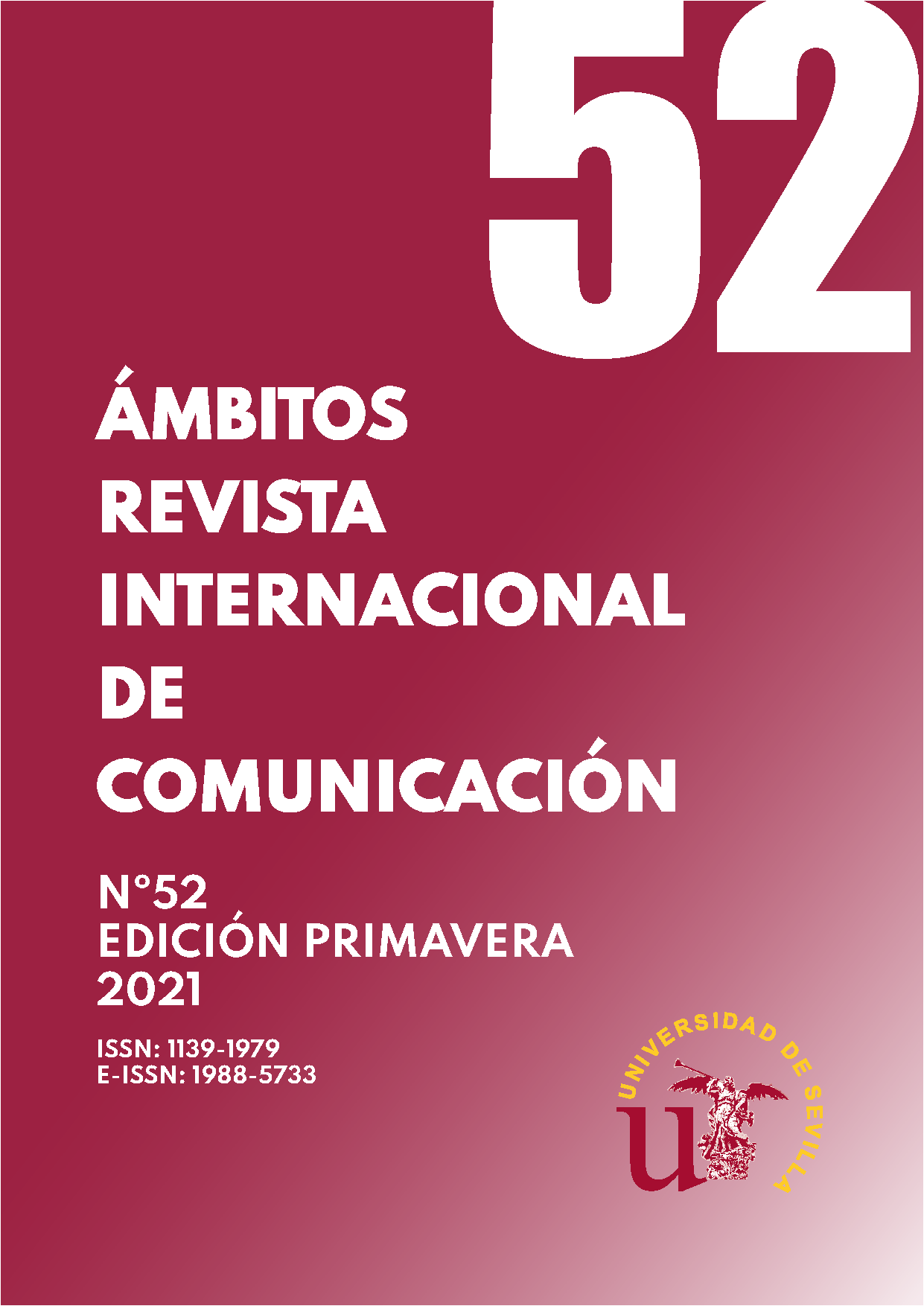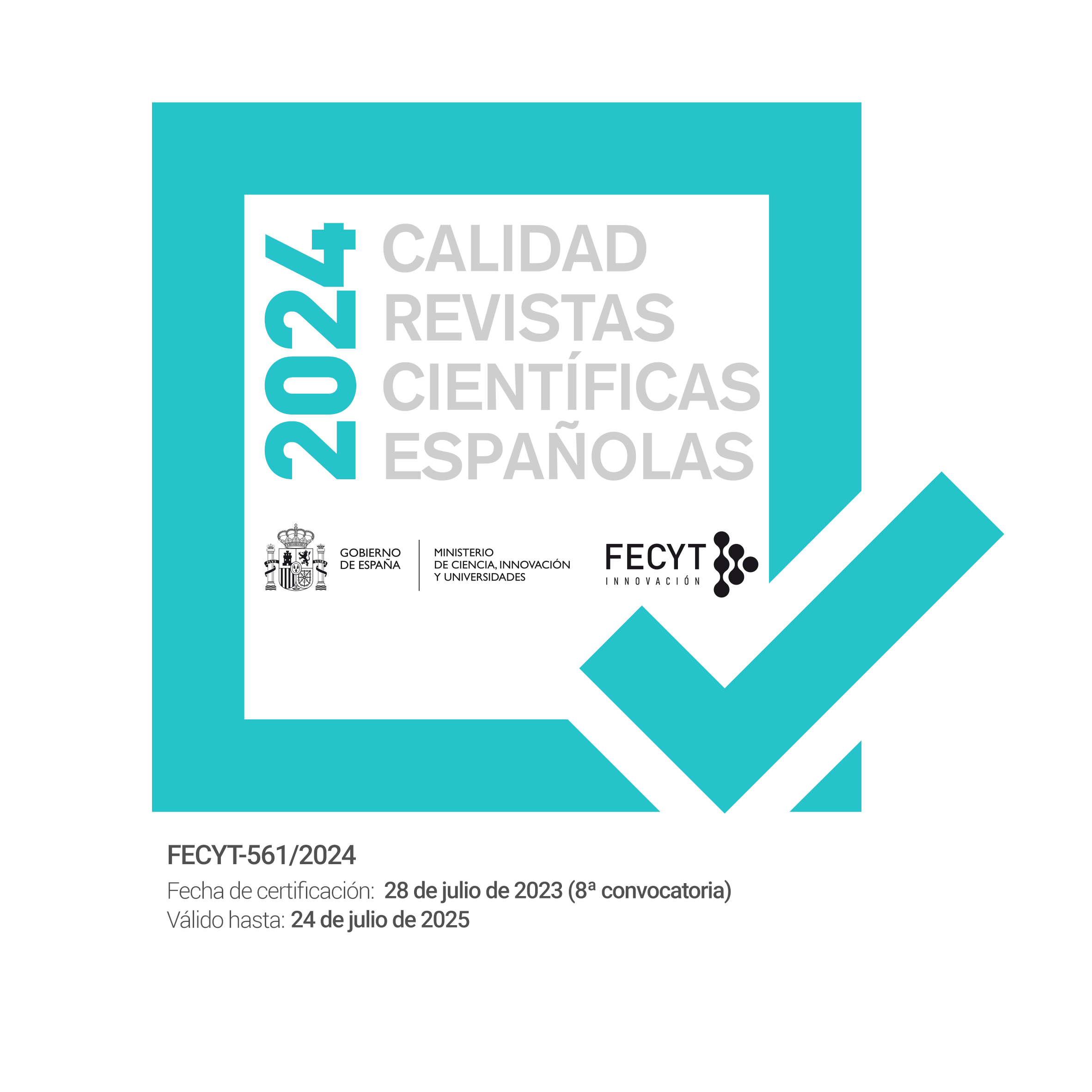Pandemic and pandemonium: an analysis on the displacements of false information in Covid-19 times
DOI:
https://doi.org/10.12795/Ambitos.2021.i52.04Keywords:
disinformation, disinfodemic, Covid-19, journalistic ethicsAbstract
This article discuss the communicational fragility in the era of disinformation in a humanitarian crisis, in this case, the global pandemic of Covid-19. The study was developed through news content analysis that reports the circulation of untrue or manipulated information about the coronavirus and that caused negative developments in the period from March to December 2020. For that, communicational concepts, deontological principles, contexts and social reflections are approached to better understand the problem. The analysis carried out in this study focused on three specific episodes: (1) the death of more than 700 people in Iran from drinking adulterated alcohol due to the rumor that the substance was the cure for the Covid-19; (2) the increase in cases of ingestion and intoxication by cleaning products in the USA after President Donald Trump suggested that the possible substances be a possible treatment for coronavirus; (3) and the omission of data on SARS-CoV-2 by China at the beginning of the pandemic. Both episodes served to illustrate the dangers of disinformation, the types of disinformation that exist and the long-term damage that false information can cause. With this, the study reinforces the importance of the verified information, as well as the relevance of journalism in the current times and, thus, it intends to contribute to its re-signification.
Keywords: Disinfodemic. Covid-19. Journalistic Ethics. Media Education
Downloads
References
Amaral, I. y Santos, J. S. (2019). Algoritmos e Redes Sociais: a propagação de fake-news na era pós-verdade. (2019). En Figueira y Santos (Eds.), As Fake News e a Nova Ordem (Des)Informativa Na Era da Pós-Verdade: Manipulação, Polarização e Filter Bubbles (pp. 63-85). Coimbra University Press.
Bardin, L. (1977). Análise de conteúdo. Presses Universitaires de France.
Becker, B. y Goes, F. (2020). Fake News: uma definição possível entre a reflexão crítica e a experiência jornalística. Âncora, Revista Latino-americana de jornalismo, 7 (1), 1-20.
Berger, Guy. (2019). Jornalismo, Fake News e Desinformação: Manual para Educação e Treinamento em Jornalismo (pp. 7-14). Unesco.
Ferraretto, L. A. y Morgado, F. (2020). Covid-19 e Comunicação: Um Guia Prático para Enfrentar a Crise. Universidade Federal do Rio Grande do Sul. https://bit.ly/3bM7SRJ
Figueira, J., Santos, S. (2019). As Fake News e a Nova Ordem (Des)Informativa Na Era da Pós-Verdade: Manipulação, Polarização e Filter Bubbles. Coimbra University Press.https://doi: 10.14195/978-989-26-1778-7
Fonseca, J. J. S. (2002). Metodologia da pesquisa científica. Apostila.
Gomes, W. y Dourado, T. (2019). Fake news, um fenômeno de comunicação política entre jornalismo, política e democracia. Revista Estudos em Jornalismo e Mídia, 16, (2), 33-45. https://doi: 0.5007/1984-6924.2019v16n2p33
Hassanian-Moghaddam, H., et al. (2020). Double Trouble: methanol outbreak in the wake of the COVID-19 pandemic in Iran - a cross-sectional assessment. Crit Care, 24, 402 https://doi: 10.1186/s13054-020-03140-w.
Islam, M. S., et al. (2020). Covid-19 – Related Infodemic and Its Impact on Public Health: A Global Social Media Analysis. The American Journal of Tropical Medicine and Hygiene, 103 (4), 1621-1629. https://doi: 10.4269/ajtmh.20-0812
Minayo, M. C. S. (2001). Pesquisa social: teoria, método e criatividade. Vozes.
Pena, F. (2005). Teoria do jornalismo. Contexto.
Quintanilla, J., Hardman, J., et. al. (2014). Reporting on Humanitarian Crises: A Manual for Trainers & Journalists and an Introduction for Humanitarian Workers. Organisation: Internews: Center of Innovation and Learning. https://bit.ly/30YvRqZ
Rezende, M. J. (2004). Linguagem Médica. AB.
Santana, G. P. y Simeão, E. (2019). Notícias falsas: origens, meios de disseminação, contextos e enfrentamento. En Seminario Hispano-Brasileño de Investigación en Información, Documentación Y Sociedad, (8). https://bit.ly/3vqI6KB
Wardle, C., y Derakhshan, H. (2017). Information Disorder: Toward an interdisciplinary framework for research and policymaking. Council of Europe report. https://bit.ly/3eE1NbV
Wardle, C. et al. (2018). Information Disorder: the essential glossary. Harvard University. https://bit.ly/3liHqm0
Downloads
Published
How to Cite
Issue
Section
License
Ámbitos. Revista Internacional de Comunicación is an open access journal, which means that all content is freely available at no charge to the user or their institution. Users may read, download, copy, distribute, distribute, print, search or link to the full text of articles, or use them for any other lawful purpose, without seeking prior permission from the publisher or author. This definition of open access is in accordance with the Budapest Open Access Initiative (BOAI).

Unless otherwise noted, all content in the electronic edition is distributed under a "Creative Commons Attribution-NonCommercial-ShareAlike 4.0 International License". You can consult the informative version and legal text of the licence here. This should be expressly stated in this way where necessary.
In case of acceptance of the manuscript, the authors cede the rights of the work for its publication to Ámbitos. Revista Internacional de Comunicación under the Attribution-NonCommercial-ShareAlike 4.0 International license contract (CC BY-NC-SA 4.0). The authors retain copyright and third parties are authorised to copy, distribute and make use of the work, provided they comply with the terms and conditions set out in the licence
- Cite the authorship and the original source of publication (journal, publisher and URL of the work).
- Do not use them for commercial purposes.
- If you remix, transform or create from the material, you must release your contributions under the same license as the original.
More information can be found at https://creativecommons.org/licenses/by-nc-sa/4.0/deed.es


















